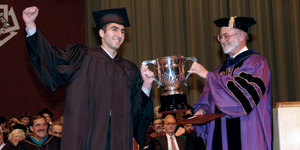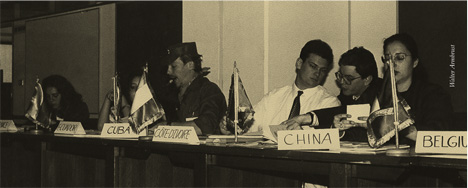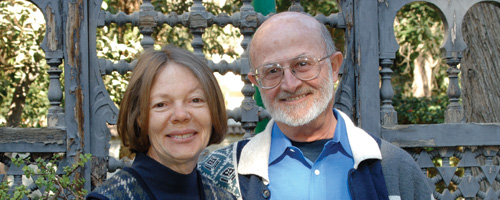In the Administration Building on the Main Campus, Provost Tim Sullivan is busy at work in his office, which is almost entirely enclosed with wooden Islamic architectural designs. With his distinctive white beard, warm smile and calm demeanor, Sullivan is a face familiar to most people at AUC.
A political science professor since 1973 and provost since 1998, Sullivan has long been an integral part of the AUC community. Students, professors and administrators all testify to his commitment, dedication and enthusiasm for the university. As he prepares to retire from AUC at the end of this academic year, Sullivan leaves behind a distinctive legacy.
“His service to the university has been extraordinary, and his academic leadership has helped propel AUC to its current position of distinction as the region’s leading private university,” said AUC President David Arnold. “As president, I have benefited enormously from Tim’s dedication and wisdom.”
Walid Kazziha, political science professor and chair of the department, also praised Sullivan as an administrator and colleague. “Tim has the excellent quality of rising above the details and addressing the major issues, and in his position as provost, he has led the university academically to new heights,” he said. “In the political science department, he will always be remembered by faculty and students as the founder and promoter of the Model United Nations (MUN) and Model Arab League (MAL).”
Sullivan received his bachelor’s in political science from Seattle University and his doctorate in international relations and government from Claremont Graduate University. He taught at the University of Portland, University of California at Los Angeles and University of Utah, in addition to AUC.
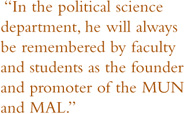 Reflecting on his time at the university, Sullivan said, “When I first came, AUC was somewhat marginal, and its degrees were not widely recognized. Now, the university is no longer marginal in Egypt or the Arab world; its graduates are in prominent positions everywhere; its faculty members are highly visible; and the number of speakers and cultural activities has increased enormously. It has truly been a privilege to be a part of this growth.”
Reflecting on his time at the university, Sullivan said, “When I first came, AUC was somewhat marginal, and its degrees were not widely recognized. Now, the university is no longer marginal in Egypt or the Arab world; its graduates are in prominent positions everywhere; its faculty members are highly visible; and the number of speakers and cultural activities has increased enormously. It has truly been a privilege to be a part of this growth.”
Having joined AUC 20 days before the war in 1973, Sullivan witnessed an extraordinary part of AUC’s history. During the war, he explained, classes were suspended, and a few faculty meetings were held on an occasional basis. “We used to meet in the Blue Room on the Greek Campus. There was a very special sense of community because we felt we were all in it together,” Sullivan said, remembering how machine guns, barricades and blued-out windows were prevalent at the time. “After the war, there was a sense of excitement in the country and at AUC. When the university reopened, we all felt that a lot was going to change.”
Even when the war was over, the 1970s proved to be a volatile time in Egypt. With the bread riots of 1977, curfews were put in place and tear gas was common. Sullivan remembered how one day, bored from their stay indoors, he and Kazziha went for a walk. “We smelled the tear gas in the street and saw a crowd throwing rocks at AUC’s Science Building. At the end, we were grateful to be able to get back home,” he said.
Sullivan noted that despite the turbulence, AUC witnessed an unprecedented period of growth that continues today. However, one thing that diminished is the sense of community among faculty members. “People became wrapped up in their own departments and interacted less as faculty. They are acting within their own departments and schools, not across departments,” he said, expressing hope that the communal sense of the past might be restored on AUC’s new campus. “Because of the layout and structure of the new campus, everything will be contiguous there.”
|
Provost Sullivan presenting the Ahmed El Mehallawi Family Award to Ossama Soliman ’05, computer science major, during the February 2005 commencement ceremony
|
As a political scientist, Sullivan’s teaching and research interests have focused on various aspects of international relations and public international law, especially in the Middle East. He has written books and book chapters on women and development in Egypt, the United Nations and multilateral diplomacy, and politics in the Arab world. For the past 35 years, Sullivan has found Egypt a fertile ground for research and exploration. “Egypt is a very interesting place to be for a political scientist,” he explained. “Issues such as political development, the status of women and international relations means that there is something new to learn everyday.”
In his classes, Sullivan was keen to deliver the material to his students in an informative and enlightening manner. “Being a political science graduate, I feel I was fortunate to be Dr. Sullivan’s student in several courses,” said Maha Abdelfattah ’98. “He always had this charming talent of teaching us about bloody wars and struggles in an enjoyable, smiling manner that made it seem as if we were discussing nice, rosy topics.”
Sharing the same viewpoint, Rhamy Abdel-Hamid ’93, said, “With Professor Sullivan, every lecture was an adventure. He made sure class was interactive by starting out the sessions with often-replicated but never-equaled comments, questions, observations and calls to action. This was a great way of starting out the lecture. It made us more aware of what was happening in the world around us and forced us to think deeper about the things we saw or heard in the news.”
For Sullivan, the AUC student body made his job special. “Teaching was more fun here than at any institution,” he said. “I like debate and exploring ideas with others, and with the diverse group of students at the university, people have different attitudes with regard to politics and religion. This triggers a real discussion in class.”
|
Sullivan at Model United Nations Security Council, April 3-6, 1991
|
Outside the classroom, Sullivan was more than just a professor. “His office was always open for us as students to pass by and chat together, not only about academic topics, but all issues of our everyday life,” said Abdelfattah.
Echoing the same sentiment, Katia Neouimina ’00 noted, “Dr. Sullivan is a mentor, role model, professor and friend. His honesty, spark in the eye and commitment to his students have drawn us to him.”
Wafaa Abdelhamid, director of the provost’s office who has been working with Sullivan for the past 10 years, noted that he never turns down a student’s request for a meeting. “Students are always his first priority,” she said. “No matter how busy he is, we have to make time for him to meet them.”
As a political science professor, Sullivan is famous for his initiation and endorsement of the MUN and MAL at AUC. It started in 1989 when the university was invited to send an MUN delegation to Moscow. “Our team did very well, and students were enthusiastic about initiating MUN at AUC,” he said. Sullivan had to start from scratch, teaching students how to organize a debate, chair a meeting, and deal with the protocols of discussion and resolutions. “It was labor intensive, but in this program, there was camaraderie among us. We were all working together to create something and sustain it,” Sullivan said, adding that such programs are essential for students’ intellectual development. “MUN does not just teach about political issues; it’s a way to stimulate people to think critically and independently, organize and assemble, and take responsibility. They are not being graded, but are being watched by everyone, so they all try to excel.”
By the same token, MAL was established a year later. “It was an interesting time to start MAL since it coincided with Iraq’s invasion of Kuwait. There was a greater range of opinions discussed in that conference than most campuses in the United States. In many ways, it replicated the real Arab League,” Sullivan said.
|
Sullivan with his wife Jeanne at their Maadi residence
|
For many of the students, these conferences represented the highlight of their AUC education. “The MUN and MAL conferences I attended shaped so much of my professional skills, debating abilities and personal character,” said Christine Assaad ’98.
Remembering an incident when students organizing an MUN conference disagreed to the point of conflict, Assaad noted how Sullivan handled the matter with a cool calm. “Tension was rising and personalities under stress were clashing, but Dr. Sullivan remained calm and appeased disasters before they occurred by providing much needed advice in the most subtle and diplomatic manner to each and every one of us,” she said. “He ensured that every conference was a success by guiding us in the right direction, while teaching us how to do it ourselves the next time. He had a keen eye in identifying his students’ strengths and helped them capitalize on these strengths.”
In the administrative realm, Sullivan left a strong imprint as provost. He was on the Century Committee that recommended moving to the new campus, as well as adding history and biology as undergraduate majors. He was also a major driving force behind the creation of the Center for Learning and Teaching and the Leadership for Education and Development Program, as well as the implementation of a code of academic integrity at AUC, accreditation of the business program, increase in faculty tenure slots, recruitment of postdoctoral fellows to teach Core Curriculum courses and development of international programs at AUC. Under his leadership, communication technology, particularly videoconferencing facilities, has spurted on campus. Sullivan is also working on raising faculty salaries. “You don’t achieve anything alone,” he said with a modest tone.
Relocating back to the United States, Sullivan will have a busy first year after retirement. He will continue to work with AUC on a consultancy basis, and will also finish the third edition of a book he is co-authoring on multilateral diplomacy. However, the thing he treasures most is being able to spend more time with his wife Jeanne and their children Mark, Erin and Colin. Mark ’92 and his wife Denise (MA ’94) both studied at AUC. Sullivan also has five grandchildren, three in Egypt and two in the United States. “I’m a family person,” he said.
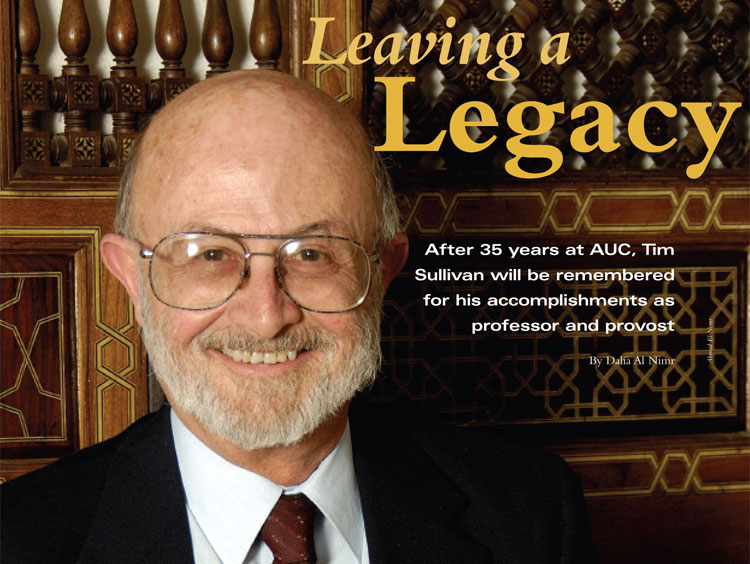
 Reflecting on his time at the university, Sullivan said, “When I first came, AUC was somewhat marginal, and its degrees were not widely recognized. Now, the university is no longer marginal in Egypt or the Arab world; its graduates are in prominent positions everywhere; its faculty members are highly visible; and the number of speakers and cultural activities has increased enormously. It has truly been a privilege to be a part of this growth.”
Reflecting on his time at the university, Sullivan said, “When I first came, AUC was somewhat marginal, and its degrees were not widely recognized. Now, the university is no longer marginal in Egypt or the Arab world; its graduates are in prominent positions everywhere; its faculty members are highly visible; and the number of speakers and cultural activities has increased enormously. It has truly been a privilege to be a part of this growth.” 